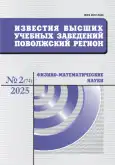On a numerical method for recovery of fractional derivative order in the generalized wave equation
- Authors: Ryazantsev V.A.1
-
Affiliations:
- Penza State University
- Issue: No 2 (2025)
- Pages: 92-103
- Section: MATHEMATICS
- URL: https://journal-vniispk.ru/2072-3040/article/view/316349
- DOI: https://doi.org/10.21685/2072-3040-2025-2-7
- ID: 316349
Cite item
Full Text
Abstract
Background. The purpose of the paper is the development of a computational algorithm for approximate recovery of derivative order in the generalized wave equation. Urgency of the stated problem is dictated not only by significant need for improvement of mathematical apparatus for solution of inverse and ill-posed problems but also by the growing number of applications of equations with partial derivatives of fractional order to math-ematical modelling in different fields of physical and technical sciences. Materials and methods. The approach for solution of the stated problem is based on its reduction to a nonlinear in the unknown parameter integral equation and subsequent solution of this integral equation with the help of continuous operator method for solution of nonlinear equations in Banach spaces. Results. Application of the continuous operator equation made it possible to develop the numerical algorithm for recovery of fractional derivative order in the generalized wave equation on the extra assumption of that the solution of this equation is additionally known at one arbitrary point. Conclusions. The approach described in this paper appears to be quite efficient for solution of inverse problems for partial differential equations with fractional order derivatives. Extending of the used approach to a wider range of inverse and ill-posed problems for equations with fractional order derivatives is of considerable interest.
About the authors
Vladimir A. Ryazantsev
Penza State University
Author for correspondence.
Email: ryazantsevv@mail.ru
Candidate of engineering sciences, associate professor of the sub-department of higher and applied mathematics
(40 Krasnaya street, Penza, Russia)References
- Ashurov R.R., Fayziev Yu.E. Inverse problem of determining the order of the fractional derivative in the wave equation. Matematicheskie zametki = Mathematical notes. 2021;110(6):824‒836. (In Russ.). doi: 10.4213/mzm13090
- Ashurov R., Sitnik S. Identification of the order of the fractional derivative for the fractional wave equation. Fractal and fractional. 2023;7(1):67. doi: 10.3390/fractalfract7010067
- Li Z., Yamamoto M. Inverse problems of determining coefficients of the fractional partial differential equations. Handbook of fractional calculus with applications. 2019;2:443‒464. doi: 10.48550/arXiv.1904.05505
- Tatar S., Ulusoy S. A uniqueness result for an inverse problem in a space-time fractional diffusion equation. Electronic Journal of Differential Equations. 2013;257:1‒9.
- Cheng J., Nakagawa J., Yamamoto M., Yamazaki T. Uniqueness in an inverse problem for a one-dimensional fractional diffusion equation. Inverse Problems. 2009;25(11). id. 115002. doi: 10.1088/0266-5611/25/11/115002
- Zheng X., Cheng J., Wang H. Uniqueness of determining the variable fractional order in variable-order time-fractional diffusion equations. Inverse Problems. 2019;35(12). id. 125002. doi: 10.1088/1361-6420/ab3aa3
- Tverdyy D.A., Parovik R.I. Solution of the inverse problem of identifying the order of fractional derivative in a mathematical model of solar activity dynamics at the rise stage. Vestnik KRAUNTs. Fiziko-matematicheskie nauki = Bulletin KRASEC. Physical and mathematical sciences. 2023;45(4):36‒51. (In Russ.). doi: 10.26117/2079-6641- 2023-45-4-36-51
- Vasil'ev V.I., Kardashevskiy A.M. Numerical identification of the order of fractional time derivative of the subdiffusion model. Matematicheskie zametki SVFU = Proceedings of the North-Eastern Federal University. 2020;27(4):60‒71. (In Russ.). doi: 10.25587/SVFU.2020.98.14.005
- Boykov I.V., Ryazantsev V.A. On one approximate method for determining the thermal conductivity coefficient. Zhurnal Srednevolzhskogo matematicheskogo obshchestva = Journal of the Middle Volga Mathematical Society. 2019;21(2):149‒163. (In Russ.). doi: 10.15507/2079-6900.21.201902.149-163
- Boykov I.V., Ryazantsev V.A. On the numerical solution of the coefficient inverse problem for hyperbolic equations. Izvestiya vysshikh uchebnykh zavedeniy. Povolzhskiy region. Fiziko-matematicheskie nauki = University proceedings. Volga region. Physical and mathematical sciences. 2019;(3):47‒62. (In Russ.). doi: 10.21685/2072-3040- 2019-3-4
- Boykov I.V., Ryazantsev V.A. On an approximate method for solving the inverse coefficient problem for the heat conduction equation. Sibirskiy zhurnal industrial'noy matematiki = Siberian Journal of Industrial Mathematics. 2021;24(2):5‒22. (In Russ.). doi: 10.33048/SIBJIM.2021.24.201
- Boykov I.V., Ryazantsev V.A. On an iterative method for solving direct and inverse problems for parabolic equations. Izvestiya Saratovskogo uni-versiteta. Novaya seriya. Seriya: Matematika. Mekhanika. Informatika = Proceedings of Saratov University. New series. Series: Mathematics. Mechanics. Computer sciences. 2023;23(3):286‒310. (In Russ.). doi: 10.18500/1816-9791-2023-23-3-286-310
- Boykov I.V., Ryazantsev V.A. Numerical reconstruction of the initial condition in Cauchy problems for linear parabolic and hyperbolic equations. Izve-stiya vysshikh uchebnykh zavedeniy. Povolzhskiy region. Fiziko-matematicheskie nauki = University proceedings. Volga region. Physical and mathematical sciences. 2020;(3):68‒84. (In Russ.). doi: 10.21685/2072-3040-2020-3-6
- Boykov I.V., Ryazantsev V.A. On a method of reconstructing the boundary condition for linear equations of parabolic type. Izvestiya vysshikh uchebnykh za-vedeniy. Povolzhskiy region. Fiziko-matematicheskie nauki = University proceedings. Volga region. Physical and mathematical sciences. 2020;(4):42‒56. (In Russ.). doi: 10.21685/2072-3040- 2020-4-4
- Boykov I.V., Ryazantsev V.A. On the problem of recovering boundary conditions in the third value problem for parabolic equation. University Proceedings. Volga region. Physical and Mathematical Sciences. 2021;(2):3‒13. doi: 10.21685/2072-3040-2021-2-1
- Boykov I.V. On a continuous method for solving nonlinear operator equations. Differentsial'nye uravneniya = Differential equations. 2012;48(9):1308‒1314. (In Russ.)
- Samko S.G., Kilbas A.A., Marichev O.I. Integraly i proizvodnye drobnogo poryadka i nekotorye ikh prilozheniya = Integrals and derivatives of fractional order and some of their applications. Minsk: Nauka i tekhnika, 1987:688. (In Russ.)
- Nakhushev A.M. Drobnoe ischislenie i ego primenenie = Fractional calculus and its applications. Moscow: Fizmatlit, 2003:272. (In Russ.)
- Uchaykin V.V. Metod drobnykh proizvodnykh = Fractional derivative method. Ul'yanovsk: Artishok, 2008:512. (In Russ.)
- Krylov V.I., Skoblya N.S. Metody priblizhennogo preobrazovaniya Fur'e i obrashcheniya preobrazovaniya Laplasa = Approximate Fourier transform and Laplace transform inversion methods. Moscow: Nauka, 1974:224. (In Russ.)
Supplementary files


























